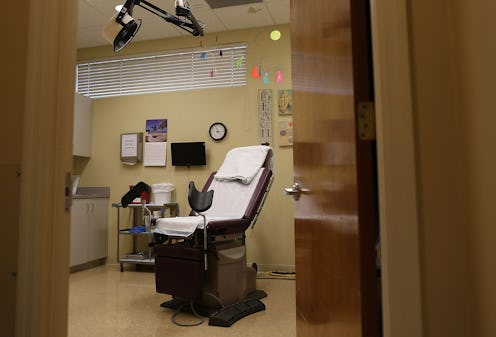News
Advocates Who Want To Bring Abortion Pills To California Campuses Will Get Another Chance

Abortion access isn't always simple, but that hasn't scared reproductive rights advocates away. Although an attempt to require California public colleges and universities to provide medication abortion — sometimes known as the "abortion pill" — on campuses statewide was ultimately defeated by Gov. Jerry Brown in September this year, the fight is not yet over. On Monday, a refreshed version of the bill was introduced in the state's legislature, and its advocates are optimistic that it will be successful.
The first iteration of the bill, which received a lot of attention earlier in the year, was vetoed by Gov. Brown. "Because the services required by this bill are widely available off-campus, this bill is not necessary," he wrote of his decision. He added that the average distance between California state university campuses and abortion care providers was between five and seven miles, which he said was "not an unreasonable distance."
But advocates for the bill say that the governor wasn't listening to the women and students who said having on-campus abortion care was important. One former student tells Bustle that she thinks Gov. Brown's decisions was "rather arrogant" and "deeply inconsiderate." She and others behind the initiative hope that California's incoming governor Gavin Newsom will see the proposal through. (In an email, a spokesperson for Newsom says that Newsom "hasn't taken a position on any bill introduced in this new session but looks forward to reading the legislation.")
"In addition to the fact that he disregarded women like me, in terms of being able to access abortion, he also just completely ignored our narrative," Adiba Khan, a recent University of California graduate, tells Bustle. "He, on his own, decided what was appropriate, or what he thinks is reality, even though we as students — students all across the state — were very clear... that students wanted this."
The bill's supporters specifically take issue with Gov. Brown's assessment that traveling five or seven miles to receive abortion care was a reasonable burden. Many students don't have cars on campus, they say, and will have to rely on lengthy public transportation trips, which could have negative implications for many students, especially those who are low-income.
"Leaving campus for abortion care takes time away from class, from internships, from family time, or work," California state Sen. Connie Leyva says in a Tuesday press call. She adds, "Students, including those who are already parents, face many barriers to the full range of sexual and reproductive health services, and these barriers disproportionately harm students of color, low-income students, and first generation college students."
And according to figures provided by Ushma Upadhyay, a professor in the Department of Obstetrics, Gynecology & Reproductive Science at the Bixby Center for Global Reproductive Health, and the Advancing New Standards in Reproductive Health (ANSIRH), at the University of California, San Francisco, the need is real. According to figures she shared during Tuesday's press call, California public college students undergo approximately 300-500 medication abortions each month.
"Campus health providers are trusted providers who already offer a wide range of reproductive health services, including birth control and STI testing…" says Sen. Leyva. "None of them provide abortion care."
Advocates agreed that there was no logical reason for student health centers in public colleges not to provide medication abortion care. "Here in California, it is time for us to step up and be a model for our fellow states," says Sen. Leyva. "We lead in so many other areas, there’s no reason we shouldn’t be leading in this area as well."